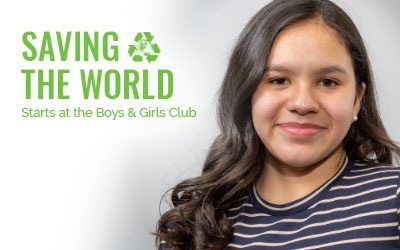“We all like to keep up with fashion trends, but these trends come in one day and go out the next,” said Boys & Girls Club member Mia. “How many of us buy a piece of clothing, thinking how beautiful it looks, only to never wear it and find it years later in our closet?”
At the Boys & Girls Club, the 16-year-old wondered about the costs of clothing. Not merely the price tag, but the costs to the environment, especially when items aren’t even worn.
Through her research, Mia learned that Americans buy five times more clothing today than they did in the 1980s. She says every year, we throw away around 80 pounds of clothing and donate just 15 percent of our wardrobes.
Mia wanted to do something. But how could she make a difference when facing with such a big problem?
“I decided to start right here at the Boys & Girls Club!” she said.
Club members Mia and Arbay sort through donated items for Our Closet, an annual tradition that provides free coats and clothes to families in need.
Mia was involved in a Club program called Money Matters, which helps kids learn about financial management, budgeting and developing life skills. Money Matters brings in mentors to teach kids, often through fun activities. She created her own addition to the training, educating her fellow Club members about consumerism and the high costs of chasing the latest clothing trends.
“We talked about repurposing and reusing clothing in order to save money and reduce clothing from going into the trash,” explained Mia. “We also talked about thrifting and donating clothes to help people in need.”
At the Club, Mia and her friends did just that. She helped with a community program called “Our Closet” that collected clothing from people around the Club and then made it freely available to anyone in need. Our Closet became a holiday tradition at the Club, opening to families after the annual Thanksgiving dinner.
Help kids like Mia become the future leaders we need.
But Mia says the costs of fast fashion are not just financial and environmental. “People buy clothes because they want to look good. People spend a lifetime trying to perfect themselves,” she said. “They look to social media to find ways to solve their insecurities, but it creates a distorted view of reality that can make people depressed because they’re chasing goals that are impossible to reach.”
With support from the Club, Mia plans to study environmental science and continue her quest to improve our planet. The Club’s leadership programs and academic supports will make sure she has the skills and opportunities she needs to keep making a difference.
Note: The photos for this story were taken before the COVID-19 pandemic.

